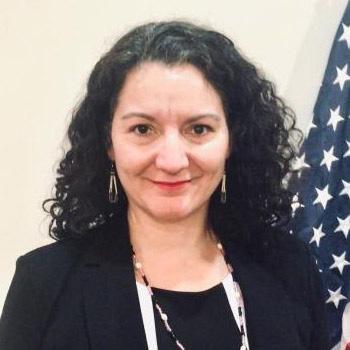VOICES FROM ACROSS THE AMERICAS:
WE WO N’T B E S I LE N T I N T H E F A CE O F V I O L ENC E! MARIZE VIEIRA DE OLIVEIRA P R E S I D E N T, I N D I G E N O U S A S S O C I AT I O N O F MARACANÃ VILLAGE (AIAM)
Indigenous women in Colombia’s most remote regions are sexual prey for armed fighters who have been killing rights defenders amid a drug war that has gone on for decades. Indigenous girls under the age of 12 are frequent victims of rape in Costa Rica, where child sex tourism is rampant and sexual assault is the highest of any country in the Americas. Age is no barrier to violence in Mexico where it is not uncommon for very young Indigenous girls to die at the hands of killers.
CLAUDIA JIMENA PAI
These are the deadly realities for Indigenous women in Latin America.
C O U N C I LO R F O R W O M E N A N D T H E FA M I LY, A S S O C I AT I O N O F TRADITIONAL INDIGENOUS AUTHORITIES – INDIGENOUS U N I T O F T H E AWÁ P E O P L E ( U N I PA )
The Indigenous women in Canada convinced the federal government to host a National Inquiry because of the extraordinary number of deaths and disappearances in their country. But it was made clear by speakers at the International Summit of the Americas on Violence Against Indigenous Women that this tragedy is occurring all across the Western world.
AMANDA TASCÓN PANCHI T E C H N I C A L C O O R D I N ATO R O F T H E D E PA R T M E N T O F WOMEN AND GENDER, I N D I G E N O U S O RG A N I Z AT I O N OF ANTIOQUIA
S A R A M AY O R G A V I L L A N U E V A G E N E R A L C O O R D I N AT O R , ALLIANCE OF INDIGENOUS WOMEN OF CENTRAL AMERICA AND MEXICO
“We won’t be silent in the face of violence!” Amanda Tascon Panchi, the Technical Co-ordinator of the Department of Gender and Women at the Indigenous Organization of Antioquia in Colombia, told the Summit. “There is a high rate of violence against Indigenous women in our communities,” said Ms. Panchi. “Previously, violence had been made invisible because women were scared and there was pressure by male assailants and authorities who prevented women from reporting it. Women are starting to speak up.” But others from Latin America who spoke at the two-day conference painted a bleak picture of life for Indigenous women in their countries. They said the safety threats in South and Central America have only grown since the pandemic forced situations of isolation and reduced supports for victims. Marize Vieira de Oliveira Guarani, President of the Associaço Indígena Aldeia Maracanã of Brazil, said Indigenous women in her country are facing increased poverty due to COVID-19 because they are unable to sell their artisan works. Meanwhile, said Ms. Guarani, conflict has increased, there is more violence and more rape, and there is a lack of portable water, food and medicine.
LAURA HERNÁNDEZ PÉREZ NAHUA PUEBLA, COLECTIVO YEHCOA UM, MÉXICO
“If it were not for traditional medicine, the number of Indigenous deaths would be greater,” she said. But “Indigenous women are overwhelmed by their own work and caring for the sick among us.” Even as the disease claims countless lives, resource development continues apace in Brazil’s rural areas, which are home to Indigenous communities. (Continued on page 20)
19
KCI-NIWESQ • NWAC








